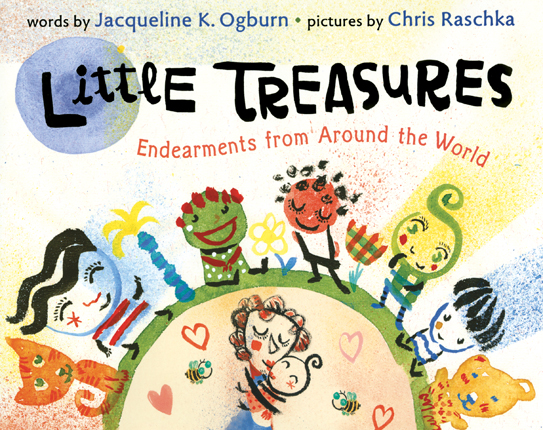Full Text Reviews: Bulletin for the Center... - 01/01/2012 Following a brief definition of “endearments,” this playful text introduces an abundance of terms used in fourteen different languages/countries/cultures around the world. Each page gives several examples from a particular country, providing definition and pronunciation for each term. The endearments vary from the fanciful (Amharic-speaking families in Ethiopia may call their little ones “yeinay filiklik,” which means “my bubble of joy”) to the funny (Brazilian Portuguese uses “docinho de coco,” which means “little coconut candy”) to the deep (one Arabic term translates to “part of my existence” and another to “light of my heart”). The text exudes affection, with the worldwide tendency of families to love their children both discussed and demonstrated throughout. Raschka’s striking ink, watercolor, and gouache illustrations use only a few colors for each spread, with the hues in the exuberant figures while the background remains a creamy sand. Though the figures are gestural, with Raschka’s familiar broadly painted informal line, they’re often faithful to the terms (“little fatty” is in fact a bit chubby, while “dumpling” is round and somewhat smushy in appearance). This will have obvious appeal for populations with large ESL groups, but it would also make an excellent gift book for your own honey/pumpkin/sunshine/babycakes. An author’s note provides some information on the selection and vetting process incorporated. HM - Copyright 2012 The Board of Trustees of the University of Illinois. Booklist - 12/15/2011 “Little coconut candy” in Brazil, “little mischievous pea” in China, and “hug bunny” in Finland. Children are addressed with endearments in many cultures. This amusing sampling starts with the U.S. and provides loving terms from 16 other cultures. Each word or expression is written in the native language, accompanied by simplified pronunciation, and translated into English. Although slightly tilted toward European cultures, the selection includes sweet names from every inhabited continent. As the author explains in appended notes, the use of endearments is common but not universal. Lively ink, watercolor, and gouache illustrations reflect the diversity without stereotyping. With a few brush strokes per figure, the pictures display a remarkable variety of people, nearly all of them smiling. Although the audience is primary-schoolers, older children will also find this an amusing, eclectic choice for diversity studies. - Copyright 2011 Booklist. School Library Journal - 01/01/2012 PreS-Gr 3—This collection of "sweet and silly names," spanning 14 languages and 6 continents, offers a beguiling smorgasbord of the ways that families around the world show their affection for their children. Some of the endearments will be familiar to American ears ("honey," "pumpkin," and "sunshine" in the U.S., "poppet," "ducky," and "love" in England, "mon petit chou" in France), but many more surely will be a revelation. They include, "little coconut candy" (docinho de coco) from Brazil, "little mischievous pea" (xiao pie dou) from Mandarin-speaking China, and "my bubble of joy" (yeinay filiklik) from Amharic-speaking Ethiopia. Each endearment is presented with its English translation, native language, pronunciation, and, where applicable, its non-Western characters or alphabetic spelling. Raschka's whimsical illustrations, drawn in ink, watercolor, and gouache on creamy flecked paper, exuberantly depict dozens of no-two-alike children, babies, and extended family members. A selective color palette in muted tones visually defines each nationality's page; the complete color spectrum is reserved for the jacket and concluding page, which express themes of world unity. Pair this with Mem Fox's Whoever You Are (Harcourt, 1997) for an effective and satisfying way of introducing the universal facets and feelings of childhood.—Kathleen Finn, St. Francis Xavier School, Winooski, VT - Copyright 2012 Publishers Weekly, Library Journal and/or School Library Journal used with permission. Loading...
|



